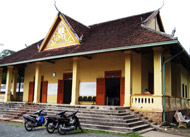Three Cambodian villagers convicted after having their land grabbed
Published on 27 July 2007At a time when the incidence of land grabbing is becoming more frequent in Cambodia and impunity for this crime is increasing for individuals with connections, wealth and power, three villagers are suffering from the results of such an unjust system. Initially, these villagers had been victims of a land grabbing dispute, however by the time their trial was over, they had been handed a six-month suspended prison sentence, lost their farming land, and had been ordered to pay a fine of 1.5 million Riel (USD $375). These villagers have now lost the ability to provide for their families and to even pay the exorbitant fine, now that their land has been unjustly taken from them.
This was the scene at the Kompong Chhnang Provincial Court on Monday, July 23, 2007 where three villagers Chem Phon, Oeu Sarom, and Oeu Sarorn stood for trial on charges of "using violence against a possessor in good faith of an immoveable property" (Article 253 of the 2001 Land Law). The three villagers had been involved in a land dispute with two individuals, Cheit Chein and Di Thunvuth, over a plot of land in Deum Popel village, Thmo Eth commune, Kampong Tralach district, Kompong Chhnang province.
The villagers had been living on the disputed land since 1984 and were granted an ownership title by the District Cadastral Office in October 1993. Cheit Chein and Di Thunvuth also claimed that they had bought this land and been granted the same land title in September 1994.
It was only 10 years later in September 2005, that Sok Bunthoeun, Chief of the Kompong Tralach District Planning Office and also the son-in-law of Cheit Chein, attempted to claim ownership over the land. Accompanied by two armed policemen, Sok Bunthoeun visited the disputed land and threatened the villagers, warning them not to farm on the land. Shortly afterwards Sok Bunthoeun filed a criminal complaint against the three villagers under Article 253 of the 2001 Land Law, accusing them of "using violence" as they continued to plant their crops on the disputed land.
Over the next two years the land dispute was never definitively resolved and on July 23, 2007 the trial for the charges of "using violence" finally took place. During the trial, Cheit Chein did not appear in court, but appointed his son-in-law Sok Bunthoeun as his representative. At trial, the prosecution failed to provide any evidence proving that the villagers had actually used any "violence" against Cheit Chein. Sok Bunthoeun claimed that in 2002, the defendants had encroached on the disputed land by planting crops and destroying a fence on the land; however, no supporting evidence or testimony was produced by the prosecution.
After the one day trial the judge found the three villagers guilty of "using violence", and ordered six month suspended sentences and fines totaling 1.5 million Riel. The judgment effectively ruled that the three villagers were not the owners of the disputed the land.
LICADHO is outraged by the court's verdict, especially given the lack of evidence produced at the trial to convict the villagers. The land dispute should not have been resolved by resorting to dubious criminal charges and the Land Law should have been respected. In particular, the courts should have applied Article 30 of the Land Law, which states that any person who has "enjoyed peaceful, uncontested possession of immoveable property that can lawfully be privately possessed" for a minimum of five years prior to 2001 has the right to ownership of the land. The villagers have had continuous occupation and use of the land since 1984, a period of twenty three years.
- Topics
- Judiciary/Rule of Law Land Rights
- Related








